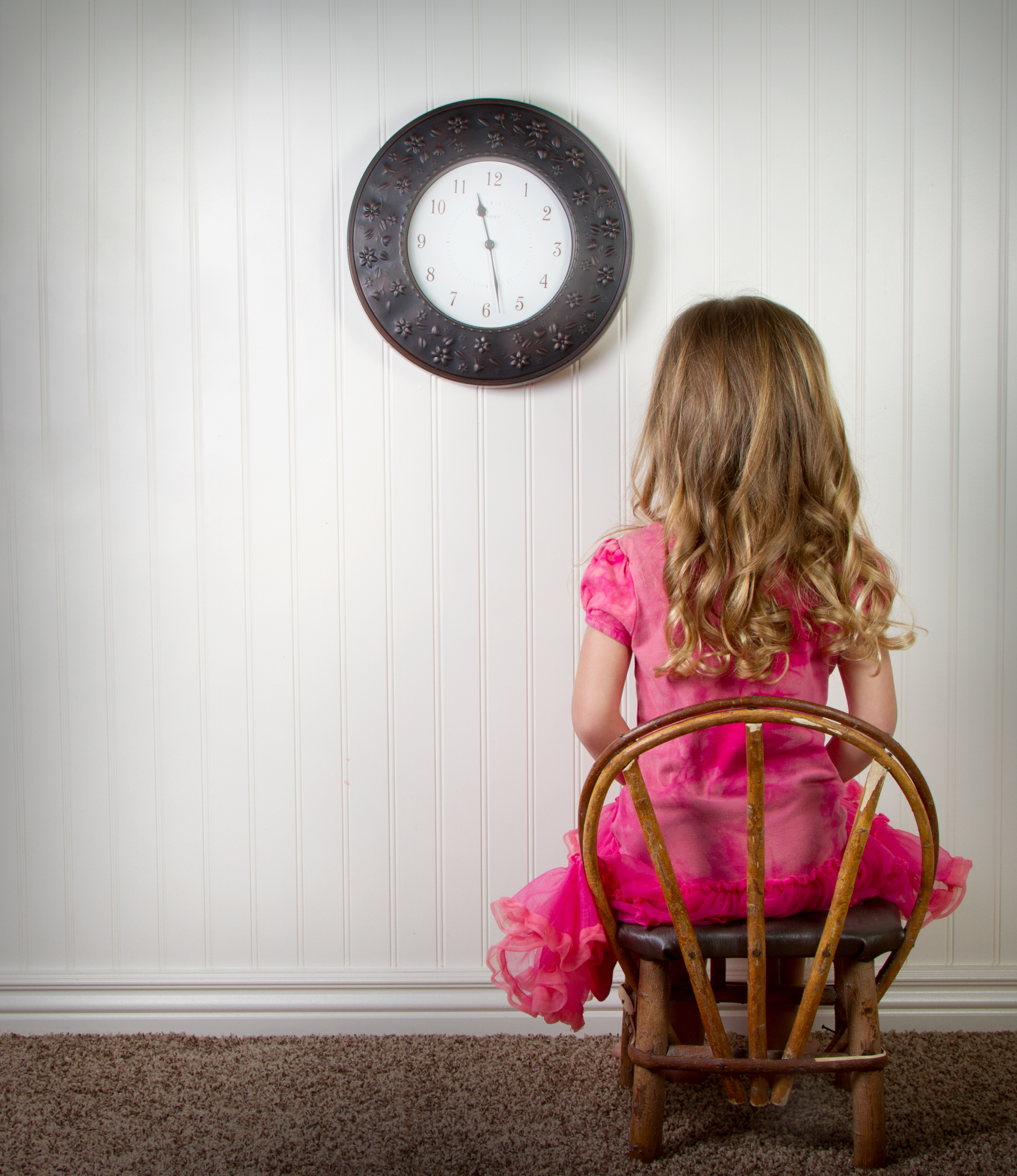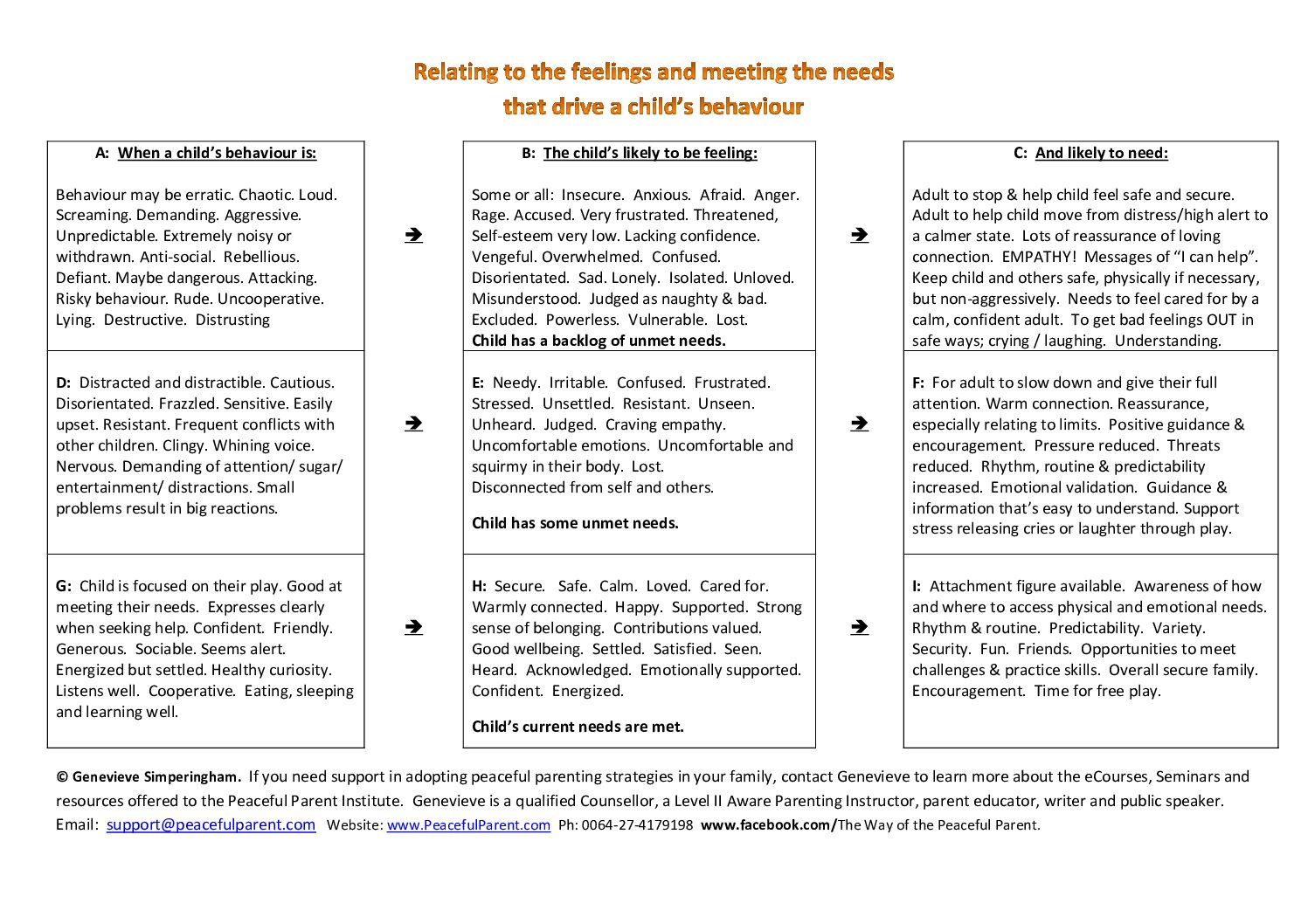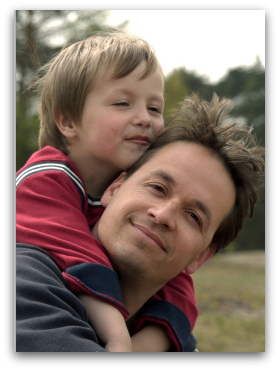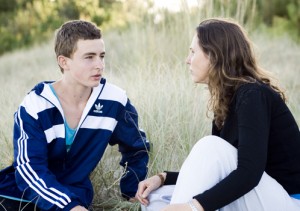We should ignore the child when they act out! – Or should we?
By Genevieve Simperingham
This article was first published in New Zealand’s Natural Parent Magazine, Summer edition 2015
Parents hear a lot of advice urging them to ignore their child when they exhibit unwanted behaviour. When the child is resisting going to sleep and repeatedly gets out of bed, parents are advised to put their hands on their young shoulders and steer them back to bed, while being careful to avoid eye contact, and keep the communication directive and minimal. Ignoring the child who is throwing a tantrum is generally recommended. Parents are advised to not “reward” negative behaviour with positive attention. We hear statements like “she’s just doing it to get your attention”. The logic generally is that denying the child positive attention will teach them that acting out isn’t going to get them what they want, which will motivate them to make different choices.
Time out is another popular approach, which essentially uses the child’s instinctive fear of separation and rejection as leverage in controlling their behaviour, in a similar way to smacking (or spanking as it’s called in some countries). Many teenagers have come to expect the silent treatment when they’ve stayed out past their curfew or otherwise broken the rules. Again, parents are often advised to say nothing, just take action; take back their car keys, then don’t even respond when the teen opens the argument.
A child’s instinctive and healthy attachment need is to seek proximity and comfort (not distance and rejection) at times of distress. And of course, the parent is advised to be equally diligent in giving lots of positive reinforcement of the desired behaviour in terms of very expressive praise. Ignoring a child and refusing to interact gives them a loud and clear message of their parent’s disapproval of the behaviour. Yet one of the problems is that when a breakdown of communication happens in the parent-child relationship, even temporarily, it causes kids of all ages stress or distress, yet the child receives little reassurance that their parent is tuning in to (their own or their child’s) feelings, thoughts and emotional needs.
Show them whose boss! Parents will staunchly tough it out and not give in to their child’s pleas to move freely again, to be picked up or held, to be answered, to be given eye contact, all in the belief that they’re teaching their child that they can’t get away with bad behaviour. Then afterwards, the child is further blamed when told how their actions gave the parent no other choice but to punish.
But more and more, parents are realizing that banishing their child to their room, or a step, or otherwise excluding them and refusing to respond to them actually doesn’t feel very good and indeed, goes against the parent’s better instincts.
Unpacking the hidden messages. We’re now in a very exciting age and stage of evolution where we have the huge advantage of a wealth of information in child development, including attachment theory, which is essentially the science of parent-child dynamics. One of the principle concepts that attachment research presents repeatedly is that the child’s instinctive attachment behaviour to seek proximity and comfort from their caregiver kicks in in stressful situations. And the parent being available as a source of comfort and security when the child needs them is right at the core of the child developing secure attachment. Having their needs to be cared for repeatedly met helps the child build a secure and positive sense of themselves and their world. Parents are reassured that their child seeking to be held and heard when upset is a normal and positive indicator of emotional health.
Professor of Social Work, David Howe states in his book Attachment across the life course that: “Securely attached children approach their carers directly and positively, knowing that their distress and upset will be recognized.”
5 FREE Discipline without Punishment Videos. What does parenting without punishment actually look like, what are the tools, how do we navigate child being uncooperative, sibling conflicts and defiance? Click here now to watch 5 free videos, each a short excerpt from one of Genevieve’s Discipline without Punishment seminars
Does time out work? Debates around different forms of discipline tend to centre a lot around what does and doesn’t work. Yet, in using rejection, isolation or withdrawal of attention as a tool to modify the child’s behaviour, we need to enquire further than “does it work?” It’s worth really unpacking some of the messages that we’re conveying to the child in using these discipline tools. Are we not bartering with a currency of attention, connection and responsiveness, and how will this serve or limit them in their current and future relationships with significant others. What might be the deeper and longer-term effects of giving the child the very clear message: “if you act in these positive ways, then I’ll be warm, communicative, loving and responsive to you, but if you act in these negative ways, then you’ll be denied warmth, and I’ll be cold, stern, withholding and staunch until your allotted time is up, or you express some form of ‘remorse’.
Peaceful parenting, on the other hand, sees punishments to be counter-productive, and instead focuses on better managing our own frustrations and reactions, while supporting our children to identify and develop healthier ways of expressing their frustrations, and building skills like problem-solving to remedy the situation. Time out often allows the parent to put on the brakes, yet we can learn to stop and step out of the intensity of a conflict and do some breathing or self-soothing to bring ourselves back to calm, while teaching our child to do the same: “ok I’m very angry and I just need to take three minutes to calm down”.
“To be understood instead of punished, to express anger and not to be rejected, to complain and be taken seriously… Such experiences may be for later childhood what sensitive responsiveness to the baby’s cries and other distress signals are for infancy.” – Robert Karen in Becoming Attached.
Being a role model is a big responsibility As a parent, I’ve always found it a really helpful, if not challenging, guiding light to remember that however I speak to and treat my kids is basically giving them my approval that this is an acceptable way of communicating with people in general. Of course, we all sometimes speak and act in ways that we regret, and as long as we have the self-awareness and humility to identify and admit our mistakes, our kids do learn the difference.
When we admit that our communication was unkind and unhelpful and empathise with how it may have affected our child, then we give them the message “actually that was a really bad choice and I regret it”. But when we say something like “well I’m sorry but I wouldn’t have yelled if you had done what you were told”, then we give the message that it’s okay to yell when the other person isn’t cooperating or being unkind.
When we force a child to stay in one place for an allotted time while ignoring or isolating them, or stonewall them by refusing to speak to them, they learn by example that rejection of another person, including refusal to respond or make eye contact, is an appropriate way to deal with a problem with another person. Yet as a counsellor, a painful relationship problem that many adults present relates to stonewalling (otherwise known as the silent treatment), a communication shut down when certain hot topics surface. And as a parent coach, a common problem that parents seek advice around relates to social fears and anxieties their child has developed relating to children harshly rejecting and excluding other children.
Stonewalling According to Kathy Nickerson, Ph.D, a clinical psychologist who specializes in relationships, “The recipient of stonewalling feels ignored, misunderstood, invalidated, and just plain hurt.” Many people tell her “they feel so unimportant that they don’t even deserve a response.”
The child who scowls at their younger sibling and pushes them over out of frustration as they say; “no bad boy, don’t break up my lego!” is not a naughty child who needs to be punished, but a child who is in the very slow and gradual process of developing impulse control and social skills, (just like other skills such as reading and writing). What they need is our genuinely patient help and guidance.
You might like to read our articles on the topic of sibling struggles and aggression.
If we want big sibling to learn to manage that aggressive impulse and say “I’m angry that you broke my lego, do you want to play with this instead?”, then the child needs to be on the receiving end of their wrongdoings being repeatedly responded to with clear non-attacking reflection, along with problem solving possible solutions; “it looks like your little brother is upset about you pushing him over, come with me honey (offering your hand) let’s help him feel better. You both want to play with the lego don’t you, hmm this is tricky isn’t it. Let’s think about how we can solve this problem?”
Aggression is a cry for help. Contrary to what parents hope, the child who’s put in time out for hurting little brother likely feels so upset and rejected, that they’re very unlikely to be able to think clearly about what might have worked better, let alone feel genuine remorse. Their thinking is likely fuelled by their upset feelings and perhaps a desire to not get caught next time. They’re unable to process all those feelings without their parent’s help, and will likely become even more resentful of little brother who started the whole thing in the first place!
Children need their parent’s reflection of the effects of their behaviour and need help thinking about what might have worked better, or what might work better next time. Children who receive feedback and guidance while also being given the message that their parent is genuinely interesting in respectfully listening to their perspective, feelings and needs are much more willing participants in the process of learning healthy social skills.
Children need help working through their feelings, rather than being put in the position of having to shut down their feelings in order to regain acceptance and support from their parent or caregiver.
“Caregiving which is responsive and reliable means that children develop an internal working model of the self that feels loved, lovable, and loving.” “Other people are experienced as attuned, loving, available, co-operative, predictable and dependable. Overall, the caregiving comes across as consistently responsive.” – David Howe, Attachment across the lifecourse.
Teenagers take on the role of putting themselves in time out. The child who is sent to their room, or otherwise put in time out, when they are young tends to become the teenager who locks themselves away in their room for hours on end when they’re not feeling so happy and breezy. They’ve learned that there isn’t a place for their hurt, grumpy and angry feelings in the family. They’ve likely internalized their parent’s rejection and unacceptance of their feelings, making it very difficult to maintain positive self-esteem when problems arise.
Aletha Solter offers lots of great advice in “raising drug-free kids”, which really focuses on raising children in such a way that they enter the teen years with healthy ways of managing uncomfortable feelings like social anxiety and anger. Avoiding punishments and keeping the lines of communication open when resolving conflicts are predictive of kids developing healthy emotional and social skills, while making them less susceptible to developing unhealthy coping strategies like alcohol or drug use, eating disorders or self-harming.
Developing a self-care mindset. Those whose feelings have been repeatedly listened to even when they’ve made mistakes or acted out are more likely to feel deserving of seeking a listening ear and reaching out to their parent (or another trustworthy person) when big challenges arise. They are more likely to view their problems as just that, problems that need to be solved, rather than further evidence of there being something inherently wrong with them. They’re more likely to choose an activity of self-care that will help them back to feeling better, rather than going down a slippery slope of negative thoughts and actions.
It’s not easy for a parent to make these kinds of connections, and as parents, we don’t need to add more weight to our guilt or fears. Yet, the more informed we are about how the parent child daily dynamics contribute to how they’re learning to treat themselves and others, then the more equipped we are to upskill, to learn more effective ways of communicating, thereby breaking unhealthy generational cycles.[/vc_column_text]
Genevieve Simperingham is a Psychosynthesis Counsellor, a Parenting Instructor and coach, public speaker, human rights advocate, writer and the founder of The Peaceful Parent Institute. Check out her articles, Peaceful Parenting eCourses, forums and one-year Peaceful Parenting Instructor Training through this website or join over 90,000 followers on her Facebook page The Way of the Peaceful Parent.










We posted a quote from your article on the Journey of Young Women FB page on Thursday Dec 10, 2015. Thank you for writing it and hope more people discover your work.
I am the page owner and would very much enjoy it if you would drop by to respond to some of the comments. Here’s the link. https://www.facebook.com/JourneyOfYoungWomen/photos/a.289772701069014.67218.187471134632505/979013775478233/?type=3&theater
One question in particular struck me this morning, if you’d be willing to answer it here: How does she address the issues of children who were spanked and then force-fed bible verses to justify, followed by forced apologies and statements of forgiveness?
Thanks so much!
Thanks for the nice article. It is so important that we love our children well so that they may love well.
With regards to “Time Outs” I don’t think you have researched it enough. Time outs is not about withholding love or delivering punishment it is about allowing time for emotion to stop overriding thinking. There are studies that show in certain emotional states we are unable to engage in reasoning. Once the chance for learning or sharing is gone then time is needed to regain composure and continue where we left off. I suspect a google search will find the research I am referring to. I do not recommend ignoring children as that is the worst kind of validation. Love wisely which can mean, love effectively. Thanks again for your time.
Hi there Robert, I can assure you that I’ve researched the fields of attachment, child development, parenting and neuroscience as it relates to child development very thoroughly over the last 20 or so years. I agree that reasoning with an upset child tends to thwart the process of emotional regulation, as it requires for them to process language which happens in a part of the brain that they don’t have much access to when they’re distressed. I agree with you that ignoring a child denies them the validation and connection they need (especially when they’re distressed). So I’m curious that you don’t recommend ignoring them, but you do agree with timeouts, so I don’t follow your logic there. I’m not sure if you’ve read the full article, I think it explains why it’s important for the child’s development of emotional regulation to maintain access to their parent’s loving support. The difficulty of course is that when the child is distressed the parent is also often distressed and unable to be that rock of strength to reassure the child and offer them the empathy they need.
It’s a big journey for so many of the parents I help to learn how to regulate their own emotional distress so they can learn to (a) avoid taking their anger out on their child and (b) learn to better tolerate their child’s upsets (which again is about calming themselves), so they can be a calming influence on their child, which may involve be there for them while they have a huge tantrum if they’ve reached that stage of emotional overwhelm. Tough challenges parents face when dealing with their child’s strong emotions.
[…] shared their surprise at how much more criticism they now attract compared to back when they used time-out, threats and liberally yelled at their […]
[…] I’d shouted at my girl, or put her in time out, it would have been trauma on top of trauma for her that day. Kids need to get those bad feelings […]
[…] are often misunderstood to be misbehaviour which perpetuates the advice to ignore the child when they’re in this state of distress. Yet when a child is in distress, they have an attachment instinct to maintain close proximity and […]